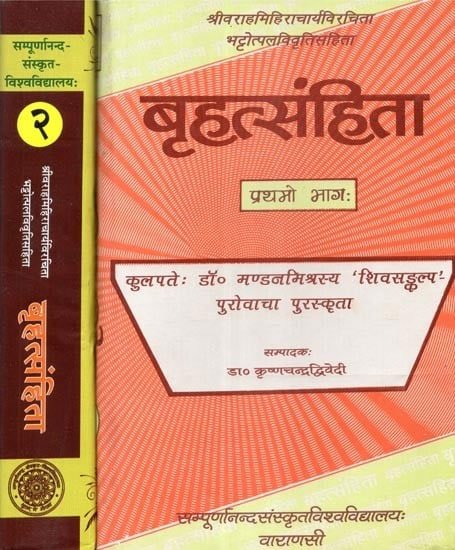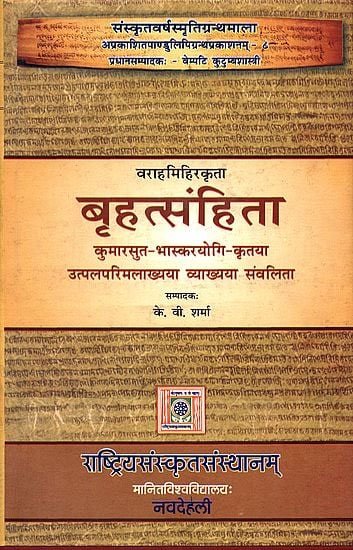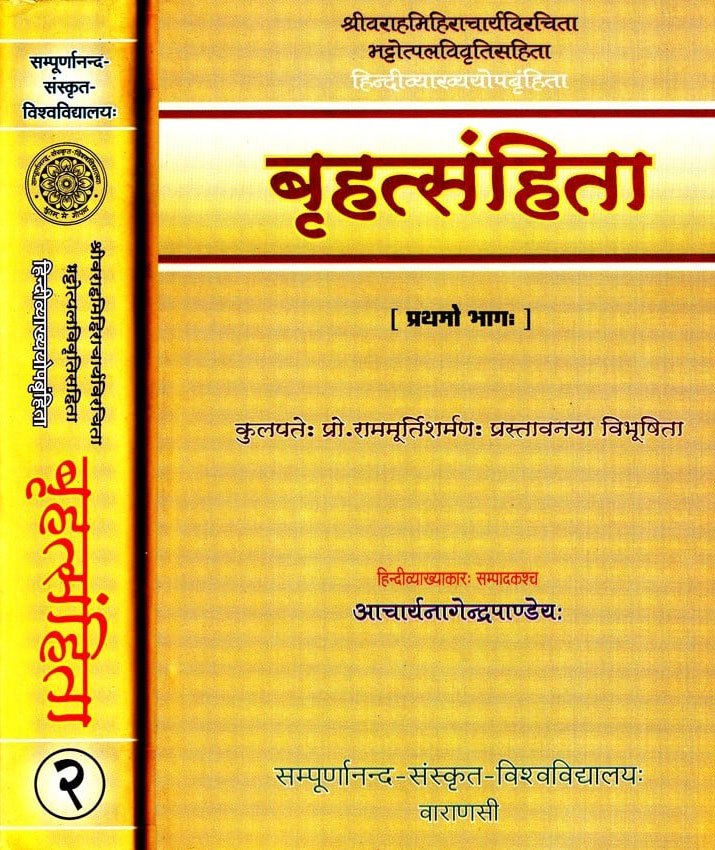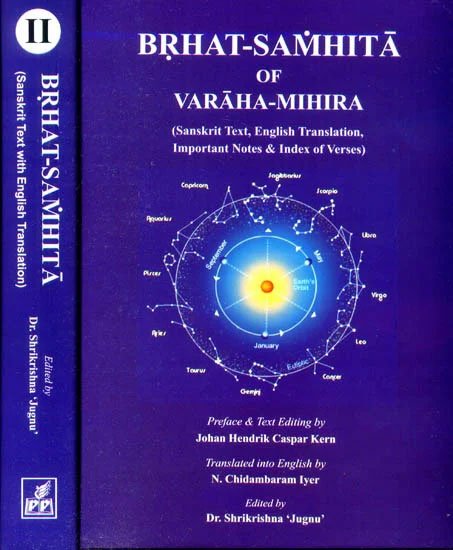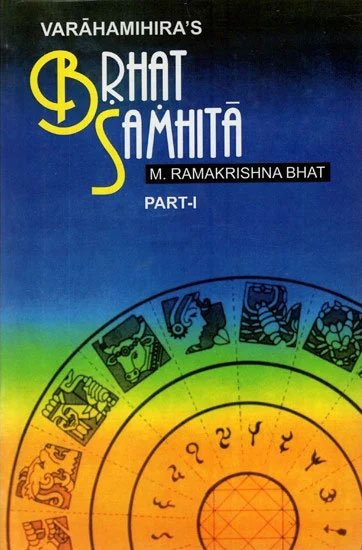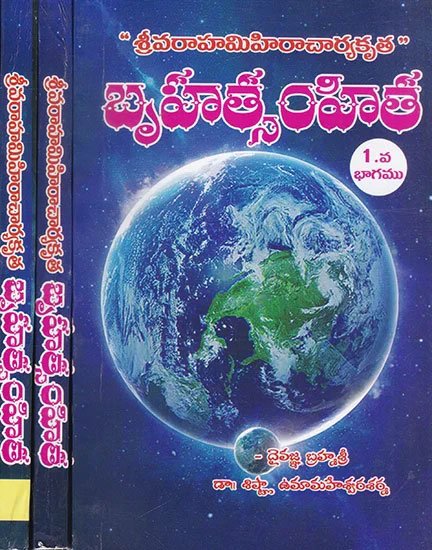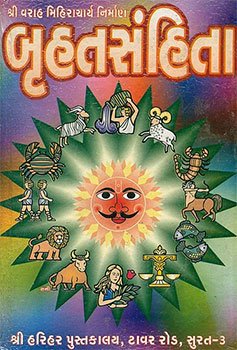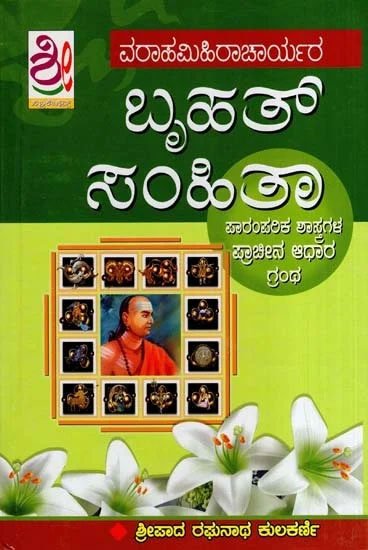Brihat-samhita [sanskrit]
26,560 words
The Sanskrit text of the Brihat-samhita from the 6th-century authored by Varaha Mihira in present-day Ujjain, India. It primarily deals with astrology and astronomy but is presented as an encyclopedia of knowledge.
Verse 67.87
नेत्रान्तपादकरताल्वधरोष्ठजिह्वा रक्ता नखाश्च खलु सप्त सुखावहानि ।
सूक्ष्माणि पञ्च दशनाङ्गुलिपर्वकेशाः साकं त्वचा कररुहा न च दुःखितानाम् ॥ ८७ ॥
[कररुहाश्च न]
netrāntapādakaratālvadharoṣṭhajihvā raktā nakhāśca khalu sapta sukhāvahāni |
sūkṣmāṇi pañca daśanāṅguliparvakeśāḥ sākaṃ tvacā kararuhā na ca duḥkhitānām || 87 ||
[kararuhāśca na]
The Sanskrit text of Verse 67.87 is contained in the book Brihata Samhita (Sanskrit Text with Hindi Translation) by Pandit Achyutananda Jha. This book is available online or you could buy the latest edition:
Read online Buy now! The Sanskrit text by Pandit Achyutananda Jha (2001)
Glossary of Sanskrit terms
Note: This extracts Sanskrit terms and links to English definitions from the glossary, based on an experimental segmentation of verse (67.87). Some terms could be superfluous while some might not be mentioned. Click on the word to show English definitions.
Netranta, Padaka, Rata, Alu, Adharoshtha, Jihva, Rakta, Nakha, Khalu, Sapta, Saptan, Sukhavaha, Sukshma, Panca, Pancan, Dashana, Guli, Parvaka, Isha, Sakam, Saka, Tvac, Tvaca, Kararuha, Duhkhita,
Analysis of Sanskrit grammar
Note: this is an experimental feature and only shows the first possible analysis of the Sanskrit text (Verse 67.87). If the system was successful in segmenting the sentence, you will see of which words it is made up of, generally consisting of Nouns, Pronouns, Verbs, Participles and Indeclinables. Click on the link to show all possible derivations of the word.
- Line 1: “netrāntapādakaratālvadharoṣṭhajihvā raktā nakhāśca khalu sapta sukhāvahāni ”
- netrānta -
-
netrānta (noun, masculine)[compound], [vocative single]
- pādaka -
-
pādaka (noun, masculine)[compound], [vocative single]pādaka (noun, neuter)[compound], [vocative single]
- ratā -
-
rata (noun, masculine)[compound], [vocative single]rata (noun, neuter)[compound], [vocative single]ratā (noun, feminine)[nominative single]√ram -> rata (participle, masculine)[vocative single from √ram class 1 verb]√ram -> rata (participle, neuter)[vocative single from √ram class 1 verb]√ram -> ratā (participle, feminine)[nominative single from √ram class 1 verb]
- alva -
-
alu (noun, feminine)[compound], [adverb], [nominative dual], [vocative dual], [accusative dual]
- adharoṣṭha -
-
adharoṣṭha (noun, masculine)[compound], [vocative single]adharoṣṭha (noun, neuter)[compound], [vocative single]
- jihvā* -
-
jihva (noun, masculine)[nominative plural], [vocative plural]jihvā (noun, feminine)[nominative plural], [vocative plural], [accusative plural]
- raktā* -
-
rakta (noun, masculine)[nominative plural], [vocative plural]raktā (noun, feminine)[nominative plural], [vocative plural], [accusative plural]√rag -> rakta (participle, masculine)[nominative plural from √rag class 1 verb], [vocative plural from √rag class 1 verb]√rag -> raktā (participle, feminine)[nominative plural from √rag class 1 verb], [vocative plural from √rag class 1 verb], [accusative plural from √rag class 1 verb]√raj -> rakta (participle, masculine)[nominative plural from √raj class 1 verb], [vocative plural from √raj class 1 verb], [nominative plural from √raj class 4 verb], [vocative plural from √raj class 4 verb]√raj -> raktā (participle, feminine)[nominative plural from √raj class 1 verb], [vocative plural from √raj class 1 verb], [accusative plural from √raj class 1 verb], [nominative plural from √raj class 4 verb], [vocative plural from √raj class 4 verb], [accusative plural from √raj class 4 verb]√rañj -> rakta (participle, masculine)[nominative plural from √rañj class 1 verb], [vocative plural from √rañj class 1 verb], [nominative plural from √rañj class 4 verb], [vocative plural from √rañj class 4 verb]√rañj -> raktā (participle, feminine)[nominative plural from √rañj class 1 verb], [vocative plural from √rañj class 1 verb], [accusative plural from √rañj class 1 verb], [nominative plural from √rañj class 4 verb], [vocative plural from √rañj class 4 verb], [accusative plural from √rañj class 4 verb]
- nakhāś -
-
nakha (noun, masculine)[nominative plural], [vocative plural]
- ca -
-
ca (indeclinable conjunction)[indeclinable conjunction]ca (noun, masculine)[compound], [vocative single]ca (noun, neuter)[compound], [vocative single]
- khalu -
-
khalu (indeclinable)[indeclinable]khalu (noun, masculine)[compound], [adverb]khalu (noun, feminine)[compound], [adverb]khalu (noun, neuter)[compound], [adverb], [nominative single], [vocative single], [accusative single]
- sapta -
-
sapta (noun, masculine)[compound], [vocative single]sapta (noun, neuter)[compound], [vocative single]saptan (noun, masculine)[compound]saptan (noun, neuter)[compound], [adverb], [nominative single], [accusative single]√sap -> sapta (participle, masculine)[vocative single from √sap class 1 verb]√sap -> sapta (participle, neuter)[vocative single from √sap class 1 verb]
- sukhāvahāni -
-
sukhāvaha (noun, neuter)[nominative plural], [vocative plural], [accusative plural]
- Line 2: “sūkṣmāṇi pañca daśanāṅguliparvakeśāḥ sākaṃ tvacā kararuhā na ca duḥkhitānām || 87 |”
- sūkṣmāṇi -
-
sūkṣma (noun, neuter)[nominative plural], [vocative plural], [accusative plural]
- pañca -
-
pañca (noun, masculine)[compound], [vocative single]pañca (noun, neuter)[compound], [vocative single]pañcan (noun, masculine)[compound]pañcan (noun, neuter)[compound], [adverb], [nominative single], [accusative single]√pañc (verb class 1)[imperative active second single]
- daśanāṅ -
-
daśanā (noun, feminine)[accusative single]
- guli -
-
gulī (noun, feminine)[adverb], [vocative single]
- parvake -
-
parvaka (noun, neuter)[compound], [nominative dual], [vocative single], [vocative dual], [accusative dual], [locative single]
- īśāḥ -
-
īśa (noun, masculine)[nominative plural], [vocative plural]īśā (noun, feminine)[nominative plural], [vocative plural], [accusative plural]
- sākam -
-
sākam (indeclinable)[indeclinable]sāka (noun, neuter)[adverb], [nominative single], [accusative single]
- tvacā -
-
tvac (noun, feminine)[instrumental single]tvacā (noun, feminine)[nominative single]
- kararuhā* -
-
kararuha (noun, masculine)[nominative plural], [vocative plural]
- na -
-
na (indeclinable particle)[indeclinable particle]na (noun, masculine)[compound], [vocative single]na (noun, neuter)[compound], [vocative single]
- ca -
-
ca (indeclinable conjunction)[indeclinable conjunction]ca (noun, masculine)[compound], [vocative single]ca (noun, neuter)[compound], [vocative single]
- duḥkhitānām -
-
duḥkhita (noun, masculine)[genitive plural]duḥkhita (noun, neuter)[genitive plural]duḥkhitā (noun, feminine)[genitive plural]
- Cannot analyse 87
Other editions:
Also see the following editions of the Sanskrit text or (alternative) English translations of the Verse 67.87
Brhatsamhita with the Commentary of Bhattotpala
by Krishna Chandra Dwivedi (2016)
Publisher: Sampurnanand Sanskrit University; 1229 pages;
Buy now!
Brihat Samhita with the Commentary of Utpalapatimala of Yogisvara
by K. V. Sharma (2012)
Publisher: Rashtriya Sanskrit Sansthan, Janakpuri; 754 pages; ISBN-10; 8186111360; ISBN-13: 9788186111369
Buy now!
Brihat Samhita (Hindi Translation)
by K. V. Sharma (2002)
Publisher: Sampurnanand Sanskrit University; 2359 pages; ISBN-13: 9789387890008.
Buy now!
Brhat Samhita (English translation)
by N. Chidambaram Iyer (2022)
Publisher: Parimal Publication Pvt. Ltd.; 801 pages; Edited by Dr. Shrikrishna Jugnu; ISBN-10: 8171104215; ISBN-13: 9788171104215.
Buy now!
Brhat Samhita (English with notes)
by M. Ramakrishna Bhat (2010)
Publisher: Motilal Banarsidas Publishers Pvt. Ltd.; 1155 pages; ISBN-10: 8120810600; ISBN-13: 9788120810600.
Buy now!
Brhat Samhita (Telugu translation)
by Sishtla Umamaheswara Sharma (2020)
Publisher: Mohan Publications, Andhra Pradesh; 846 pages.
Buy now!Preview of verse 67.87 in Kannada sript:
ನೇತ್ರಾನ್ತಪಾದಕರತಾಲ್ವಧರೋಷ್ಠಜಿಹ್ವಾ ರಕ್ತಾ ನಖಾಶ್ಚ ಖಲು ಸಪ್ತ ಸುಖಾವಹಾನಿ ।
ಸೂಕ್ಷ್ಮಾಣಿ ಪಞ್ಚ ದಶನಾಙ್ಗುಲಿಪರ್ವಕೇಶಾಃ ಸಾಕಂ ತ್ವಚಾ ಕರರುಹಾ ನ ಚ ದುಃಖಿತಾನಾಮ್ ॥ ೮೭ ॥
[ಕರರುಹಾಶ್ಚ ನ]
Brhat Samhita (Gujarati translation)
by - (2000)
Publisher: Shree Harihar Pustakalay, Surat; Author: Shri Varahamihira Acharya (શ્રી વરાહમિહીરાચાર્ય); 432 pages.
Buy now!Preview of verse 67.87 in Gujarati sript:
નેત્રાન્તપાદકરતાલ્વધરોષ્ઠજિહ્વા રક્તા નખાશ્ચ ખલુ સપ્ત સુખાવહાનિ ।
સૂક્ષ્માણિ પઞ્ચ દશનાઙ્ગુલિપર્વકેશાઃ સાકં ત્વચા કરરુહા ન ચ દુઃખિતાનામ્ ॥ ૮૭ ॥
[કરરુહાશ્ચ ન]
Brhat Samhita (Kannada translation)
by Sripada Raghunatha Kulkarni (2021)
Publisher: Srinidhi Publications, Bangalore; 668 pages with illustrations.
Buy now!Preview of verse 67.87 in Kannada sript:
ನೇತ್ರಾನ್ತಪಾದಕರತಾಲ್ವಧರೋಷ್ಠಜಿಹ್ವಾ ರಕ್ತಾ ನಖಾಶ್ಚ ಖಲು ಸಪ್ತ ಸುಖಾವಹಾನಿ ।
ಸೂಕ್ಷ್ಮಾಣಿ ಪಞ್ಚ ದಶನಾಙ್ಗುಲಿಪರ್ವಕೇಶಾಃ ಸಾಕಂ ತ್ವಚಾ ಕರರುಹಾ ನ ಚ ದುಃಖಿತಾನಾಮ್ ॥ ೮೭ ॥
[ಕರರುಹಾಶ್ಚ ನ]
![Brihat-samhita [sanskrit] - book cover](/uploads/a/Brihat-Samhita-Sanskrit.jpg)
